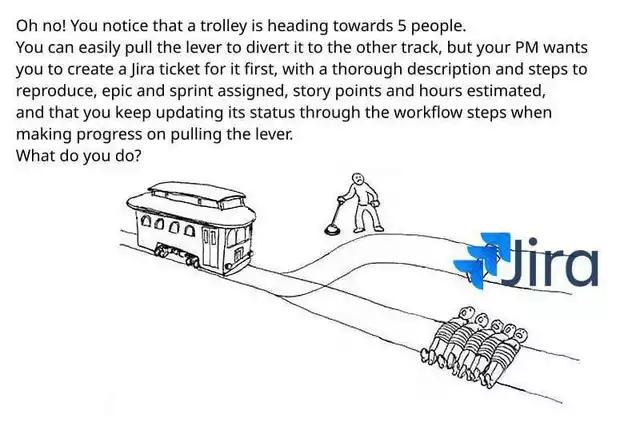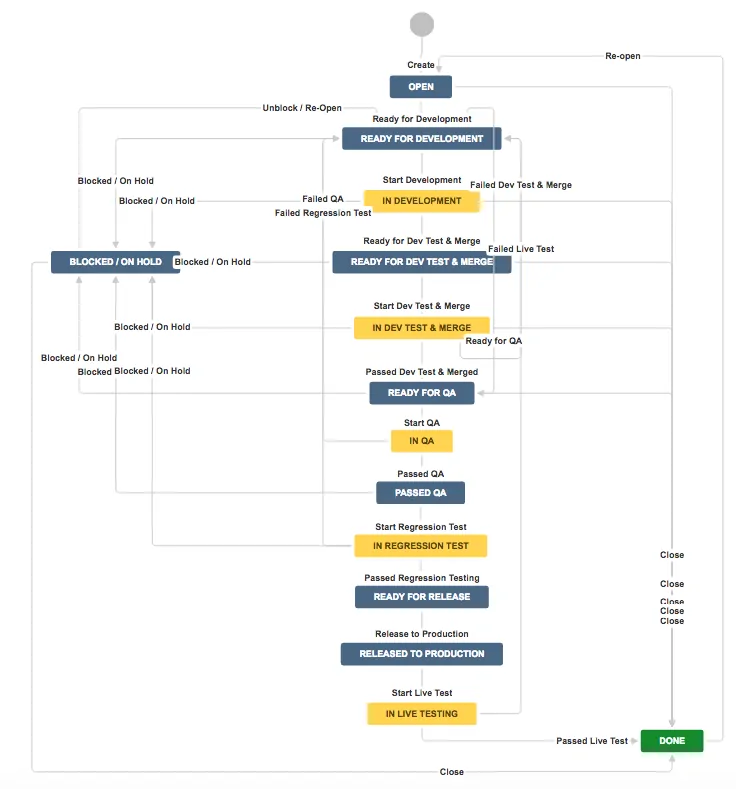You don't hate JIRA, you hate your manager
It seems like it has become popular to hate on JIRA. In fact, a good friend of mine sent me this, which is what triggered this post:
(if you're the owner of the image, reach out to me and I'll attribute it properly)

I'm usually not one to run to the defense of a specific technology, especially one I hate. Though, I think it's important that people hate things for the right reason. The fact is, JIRA is still simply the best tool for tracking customized tasks with customized workflows and being able to perform powerful searches and reports against them. The key here is "customized". There are many platforms that will charge the same or less than JIRA and offer you a pretty project workspace with tasks - but it's usually missing one of the customization or searching features I mentioned above.
The most common reasons I hear for hating on JIRA are:
- It's too complicated
- I spend more time tracking tickets than doing work
To that I say...
You hate your micro-Manager
JIRA is only as complicated as you make it. It comes out of the box with very simple workflows and very few fields on the page. It takes 5 minutes to get going with tasks that just go from Open -> In Progress -> Closed. This is not too much to ask. Any person should be able to report this much information on their task.

For people who know JIRA, you can see that this default "workflow" has now been diluted to not enforce ANY steps, which makes everything just stickies on a board.
If you find JIRA is too complicated, it's because whoever set it up created way more steps, screens, and fields than are probably necessary for your work.
A quick search for "complicated JIRA workflow" resulted in this image from idalko.com, which appears to be a group that helps people with their business processes. This is their example of how NOT to do a workflow.

If your flow is like this, you don't hate JIRA, you hate your manager that put this in place. JIRA just happens to be a great tool for building flows like this, but it can't stop people from using it incorrectly.
You hate your non-Manager
The other common problem is a non-Manager - a "manager" who doesn't talk to you and doesn't know much about what you're working on. They just want to check a dashboard, see all green lights, report to their managers that the light is green, and collect their pay check.
This type of manager asks for detailed time estimates, 10 steps in the workflow, and daily updates. JIRA is a great tool that can do all of these things, but it doesn't mean they should be done. JIRA does not replace the need for skilled managers and team leads that actually know what's going on.
You hate any manager (transparency)
Let's be honest; it might not be your manager, it might be you. In some projects I've worked on, no amount of tracking is welcomed.
Some people want to be given work, plenty of time to do it, and make sure no one else knows how to do their work - lest they be replaced. Before the remote-work-revolution, it was harder to get replaced. Now, quick access to global talent makes it much easier to get replaced. I guess it's why some people have become more protective of their work.
This is wrong, and it's the exact reason that companies employ micro managers and non-managers. Most companies just want to make money, and their developers and managers are variables in a formula to make that happen. They want to replace you with a cheaper version that can do the same thing. These are likely not the companies you want to work at.
I believe there will always be work for skilled, hard workers. The skills you need to have may change, but there is always work to be done. Focus your time on honing those skills and finding a good place to work, rather than trying to protect your current job by hiding your work.
You Hate Learning
If you're the one setting JIRA up, cursing the complexity, it's probably because you didn't take a time to read Atlassian's thorough documentation. You were hoping JIRA would be an easy button to manage your projects. You want the features it offers, but you don't want to take the time to learn how to use the tool.
Well, that's a problem with everything - not just JIRA. Based on the common reasons people hate JIRA, you should think twice about if you really need this complexity functionality - your team may hate it.
If you determine you do need this extra functionality, then take the time to learn it or pay someone who knows how to do it already.
Why I hate JIRA
Cloud-Pushers
For years, they've had a holier-than-thou approach to cloud migration. In the beginning of this move some of their biggest customers were insisting they needed to stay on-premise with JIRA Server. Atlassian told these customers that they just "didn't understand the benefits of the cloud yet", and would be given a bit more time to understand.
Their customers pushed back enough that Atlassian has committed to maintaining an on-premise version - JIRA Data Center. It's functionally the same for customers who previously used JIRA Server, but now customers get the pleasure of spending about 4x the licensing cost. It will come as no surprise that the Data Center offering costs about as much as their cloud offering. They are hoping they can force hold-outs to the cloud, or at least make more money off of their "stubborn" customers.
Profit Protectionists
As we can see from the cost model for moving to the cloud, Atlassian is quite focused on milking more out of their cash cow. The unfortunate thing is that JIRA itself has not changed much in the last 10 years. Atlassian has continually increased the price of JIRA without adding meaningful features, while popular feature requests have been unanswered for over 12 years. Atlassian is not interested in building a new better product; they are interested in charging more for the same old thing.
UX Churn
In an attempt to justify increasing costs, they are constantly changing the UI in their cloud environment. This is one of the big pain points with the cloud. Atlassian strong-armed many customers into using the cloud offering, and now frequently changes the UI whether customers like it or not. This has a serious impact on companies that already struggle to get their teams to use an application they find "complicated".
No one has replaced them yet!
With all my grievances listed above, the thing I hate most is that no one has replaced JIRA yet. It has been the same for the last 10 years, and no one has made a good enough replacement. Yes, there are many issue trackers that let you assign tasks to people and change a status - but they don't allow a customized workflow that can be enforced. For large-scale teams doing distributed work in a consistent way, this is critical, and it's probably why people still use JIRA.

Comments